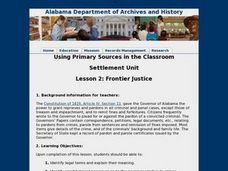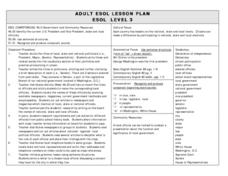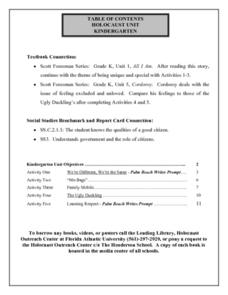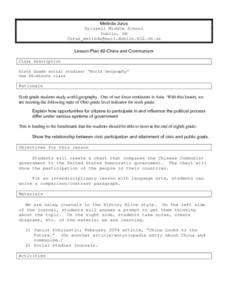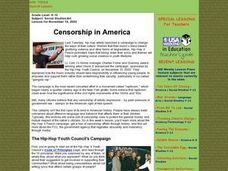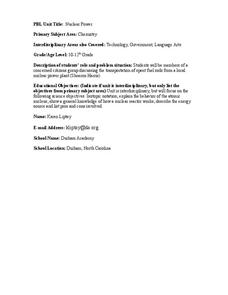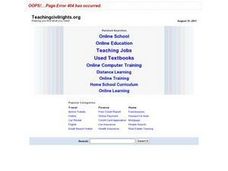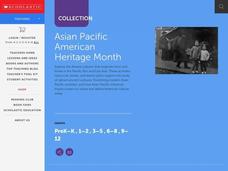Curated OER
Frontier Justice
Learners make an investigation into the Constitution of 1819, Article IV, Section II, gave the Governor of Alabama the power to grant reprieves and pardons in all criminal and penal cases, except those of treason and impeachment, and to...
Curated OER
The Global Warming Cover-Up
Young scholars explore the basic background on the causes of global climate disruption and governmental and economic reasons for downplaying its causes. Key reasons why US citizens have largely ignored the issues are examined in this...
Curated OER
Who Are Your Local Officials?
Students identify the names and positions held by local public officials. In pairs, students research the requirements and duties needed to hold office. A brief presentation of their research will include the names and positions of...
Curated OER
Cartoons for the Classroom: Sunshine Week
In this current events activity, students analyze a political cartoon about sunshine week and open government and respond to 3 talking point questions.
Curated OER
Voting And Elections
Students examine the voting practices of the past several presidential elections while using data to determine the influence of different factors. They identify the reasons for high or low voter turnout and then display the outcome of...
Curated OER
Kindergarten Holocaust Unit
Students determine that we are the same. They discuss that we have differences and realize our differences make us special. They recall the ways in which human beings and Sesame Street characters are alike. They create a second...
Curated OER
Government: War Powers Limitations
Students examine historic examples of authority during wartime. They interpret the Fifth Amendment. They debate the merits of the Patriot Act.
Curated OER
Who's Town is This, Anyway?
Fifth graders work in cooperative groups to simulate a town government as they consider an important change in their community growth. They analyze a real problem in the community and then determine their goals to fix it and make a...
Curated OER
Progressivism
Students interpret historical evidence presented in primary and secondary resources. In this Progressive Era lesson, students examine the concerns of American citizens during the era and compare them to...
Curated OER
Asian Tsunami
Students discuss natural disasters, global community and address Students concerns and worries. They review thoughts about the tsunami written by students logging onto the Newsround website and determine which statements they relate to.
Curated OER
Barriers to Immigration: The Chinese Exclusion Act
Students study the Chinese Exclusion Act and its impact on the Chinese here in the US and abroad. They watch a video, then perform research which is guided by worksheets imbedded in this lesson plan.
Curated OER
China and Communism
Sixth graders discuss what might happen if United States government took over media ownership, read Junior Scholastic article entitled "China Looks to the Future," and create chart comparing Chinese Communist government to United States...
Curated OER
Censorship in America
Students follow resource links to study the history of art censorship in the US. They study the work of the FCC and the Hip-Hop 4 Peace campaign.
Curated OER
Nuclear Power
Students take on the role of members of a concerned citizens group and discuss the transportation of spent-fuel rods from a local nuclear power plant and the safety issues that surround the power plant. Students work in groups to write...
Curated OER
Dekanawidah- A Forgotten Founding Father
Learners compare plans for government. In this early American history lesson, students compare and contrast the U.S. Constitution with the Iroquois Constitution. Learners identify cultural features, government functions, and citizenship...
Curated OER
A Modern Connection to Genocide
Students investigate the genocide that occurred in Rwanda. They read and discuss an article, watch a Frontline video, complete a worksheet for the video, and write a letter to the Rwandan government or United Nations about the...
Curated OER
When is Humanitarian Intervention Justified?
Students analyze different foreign policies to derive their own idea of what constitutes appropriate intervention by a government. They complete a detailed proposal for their own Declaration of Human Rights.
Curated OER
Lesson Plan: The Car Chase Scence
Learners investigate how to be informed when buying a car. In this research skills lesson, students use the Federal Citizen Information Center Website to find information they need to complete an activity featuring all of the costs of...
Curated OER
Vote for Me!
Tenth graders analyze voter trends in South Carolina and discover techniques canddidates and their parties use to convince us to vote their way. They are able to locate voting statistics for their county; compare the number of...
Curated OER
Looking for Heroes
Students explain the importance of the 1965 Selma-to-Montgomery Voting Rights March and the long term impact in the US of non violent civic participation.
Curated OER
Amending the Constitution
Young scholars research the history of the process of amending the US Constitution to explain the latest amendment that failed on June 28, 2006. They complete the research and view images online.
Curated OER
"Real Life" Budgeting Project
Students experience what it is like to be a responsible citizen through a monthly budget through using a variety of research skills.
They apply collected data in a decision making exercise and
present the final product in a clear and...
Curated OER
Armed Forces Day Reading Comprehension Passage
In this reading comprehension/ holiday worksheet, students read a passage about Armed Forces Day which is celebrated on the third Saturday in May in the US. They answer 6 short answer, fill in the blank questions based on the reading.
Curated OER
Japanese American Baseball in the Camps
Students study Japanese American internment camps. In this American history lesson plan, students compare and contrast the camp internees' experiences with with team sports-related challenges students have encountered. Students discuss...


